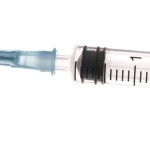 A new study has shown that adults don’t need to be given a tetanus booster shot every 10 years. This would save millions of dollars in health care costs if the adult vaccination schedule was revised.
A new study has shown that adults don’t need to be given a tetanus booster shot every 10 years. This would save millions of dollars in health care costs if the adult vaccination schedule was revised.
Tetanus, or as it is commonly called, lockjaw, is a very serious disease. The Centers for Disease Control and Prevention (CDC) estimates that 13 percent of people who contract tetanus die, and in some at-risk populations, the mortality rate jumps to 30 percent.
While a natural immunity is often conferred after surviving an infectious disease, tetanus is not one of those diseases, and if someone survives a lockjaw infection, they can get it again. That’s why young children have to go through a five-shot series and then face regularly scheduled booster shots to maintain a defense against infection.
Currently, the CDC recommends that adults need a tetanus booster shot every 10 years to be safe from infection, but new research from the Oregon Health & Science University (OHSU) suggests the CDC schedule of booster shots may be overdoing it a bit, reports the Inquisitr.
“We have always been told to get a tetanus shot every 10 years, but actually, there is very little data to prove or disprove that timeline,” said researcher Mark Slifka, a professor at the Oregon National Primate Research Center at OHSU. UPI says the researchers also say that a revised adult vaccination schedule could save the health care industry hundreds of millions of dollars.
The study was limited in its scope, examining only 546 adults who had been given all the needed five-dose schedule of childhood vaccinations for tetanus. Slifka said, “When we looked at the levels of immunity among 546 adults, we realized that antibody titers against tetanus and diphtheria lasted much longer than previously believed.”
The research team concluded that adults actually appeared to have a 30-year immunity to tetanus and diphtheria after having the childhood vaccination series. Slifka believes that if a revised adult vaccination schedule were to be implemented, adults, after completing the childhood series would only have to have a tetanus booster at age 30 and again at age 60.
“If you ask around, you often find that it is hard for people to remember if they had their last tetanus shot eight years ago or even 11 years ago,” says Slifka on the OHSU website. “If we were to use a simple age-based system, people would only have to remember to get their shots when they turn 30 and again when they turn 60.”
Based on the number of adults who get tetanus boosters every 10 years, the study suggests that changing to a 30-year schedule would cut the number of vaccinations by two-thirds, saving $280 million in health care costs, or about $1 billion in four years.
The study, “Durability of Vaccine-Induced Immunity Against Tetanus and Diphtheria Toxins: A Cross-sectional Analysis,” was published in the journal Clinical Infectious Diseases on March 21, 2016.
Source: Digital Journal

















